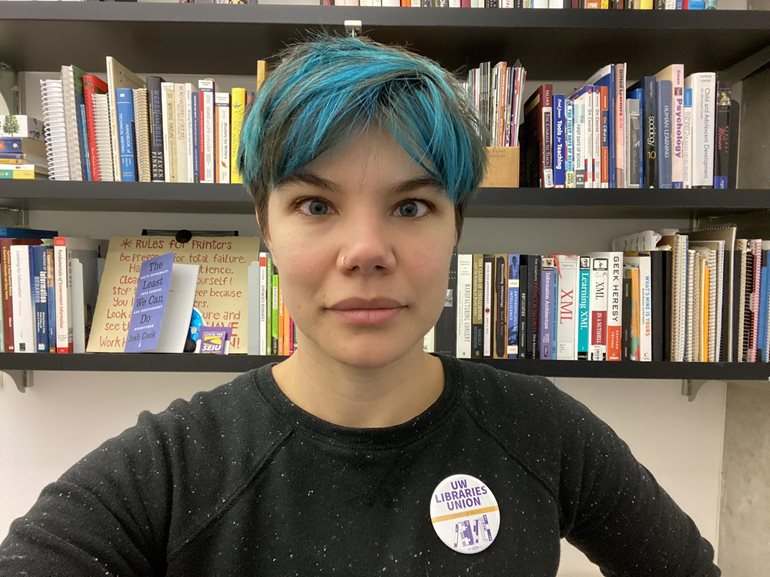How is work in the UW Bothell/Cascadia College Library?
Je Salvador, research and instruction librarian, answers a few questions from Maria Lamarca Anderson, director of communications.
Q. How do you try to innovate?

A. The most innovative thing I’m doing right now is trying to integrate care into my work. On this topic, an article from June 2020 by Veronica Arellano Douglas titled “Moving from Critical Assessment to Assessment as Care” has really stuck with me. The conversation about care in libraries has motivated me to bring my whole self to work (especially to the research desk and the information literacy classroom), to reflect on intentional boundary-setting, to reflect on the mutuality of well-being between and among students and library workers, and to intentionally integrate an ethic of care and connection in all my position responsibilities.
Q. What is the core of your work?
A. The core of my work is to provide library users — especially students — access to information and to support attitudes and practices for lifelong learning.
Q. How do any or all of UW Bothell’s three strategic priorities fit into your work? How do you advance this part of our shared work within your unit or across campus?
A. I like to think that I contribute a bit to this shared effort with my work, but I know the folx who are truly advancing these principles at the Campus Library and on our co-located campus are the Access Services staff here who worked to re-open the library building safely and keep it open safely despite the coronavirus pandemic, social upheaval and the resurgence of white nationalist ideas in U.S. mainstream discourse. This unit provided access to items and study spaces in the library even when, at the beginning of this winter quarter, faculty and students were encouraged to teach and learn remotely. A university library is an intersection of community engagement and cross-disciplinary scholarship, and ours strives for equity in access and representation.
Right now, the Access Services unit is preparing for the end of the state’s mask mandate this week while UW Libraries will maintain an indoor masking requirement until March 28. The work is complex and multifaceted. I try to support the work of our Access Services unit as my time and skills allow, and theirs is the example I try to follow for advancing our shared priorities.
Q. What are you working on today?
A. I just finalized a follow-up lesson plan for one of the MisinfoDay 2022 presentations. MisinfoDay on March 15 is a statewide media literacy event with virtual workshops, resources and other classroom activities designed for middle and high school students, teachers, librarians and other educators, co-presented by the University of Washington Center for an Informed Public and Washington State University’s Edward R. Murrow College of Communication. Dr. Justin Gill, a lecturer in the School of Nursing & Health Studies, has provided a pre-recorded presentation titled “Misinformation during a global pandemic,” and I created an accompanying activity so that our Washington state teachers and students could take a deeper dive into avoiding confirmation bias, which is one of Justin’s topics.
Q. How does who you are show up in your work?
A. The short version: It shows up in my appreciation for and desire to learn from collaboration.
The TL;DR version: OK, every time I consider this question I’m reminded of when, about six months into the U.S. experience of this COVID-19 pandemic, a dear colleague said, “We bring our whole selves to work — whether we want to or not.” The pandemic has exposed, among many underlying issues, the raw edge of certain workers’ lives when our home-work frontiers collapse. I hope some of the characteristics I like most about myself — attention to detail, enthusiasm for teamwork, passion for creative and lateral thinking — show up in my work and in my work relationships. When my shortcomings, too, show up at work — for example, when, recently, a colleague at Cascadia College gently advised me that I “can’t necessarily make that assumption” on a topic about which I was feeling pretty spicy — I feel grateful and humbled to work with decent and honest folx who’ll try to help me grow.
Q. Where is your favorite spot on campus, and why?
A. This is a difficult choice, but my favorite spot today — outside of the Campus Library — is the Food Forest. I’m pining to enjoy its fruits again!
Q. What is your favorite thing about working at UW Bothell?
A. The community at UW Bothell — students, staff, faculty, crows, bees, beavers, snakes, pollinator-friendly plants, trees — is simply what makes it for me.



